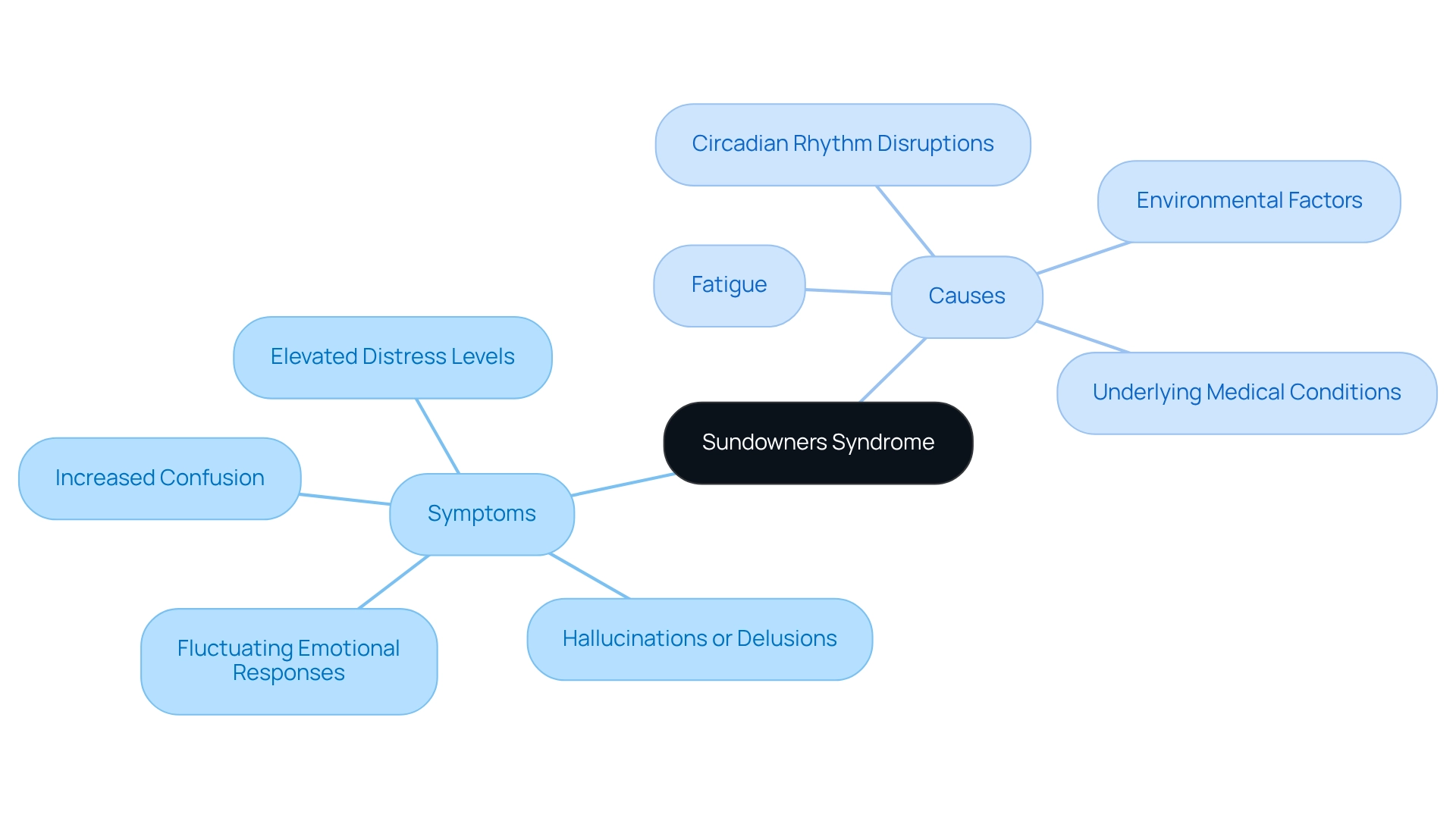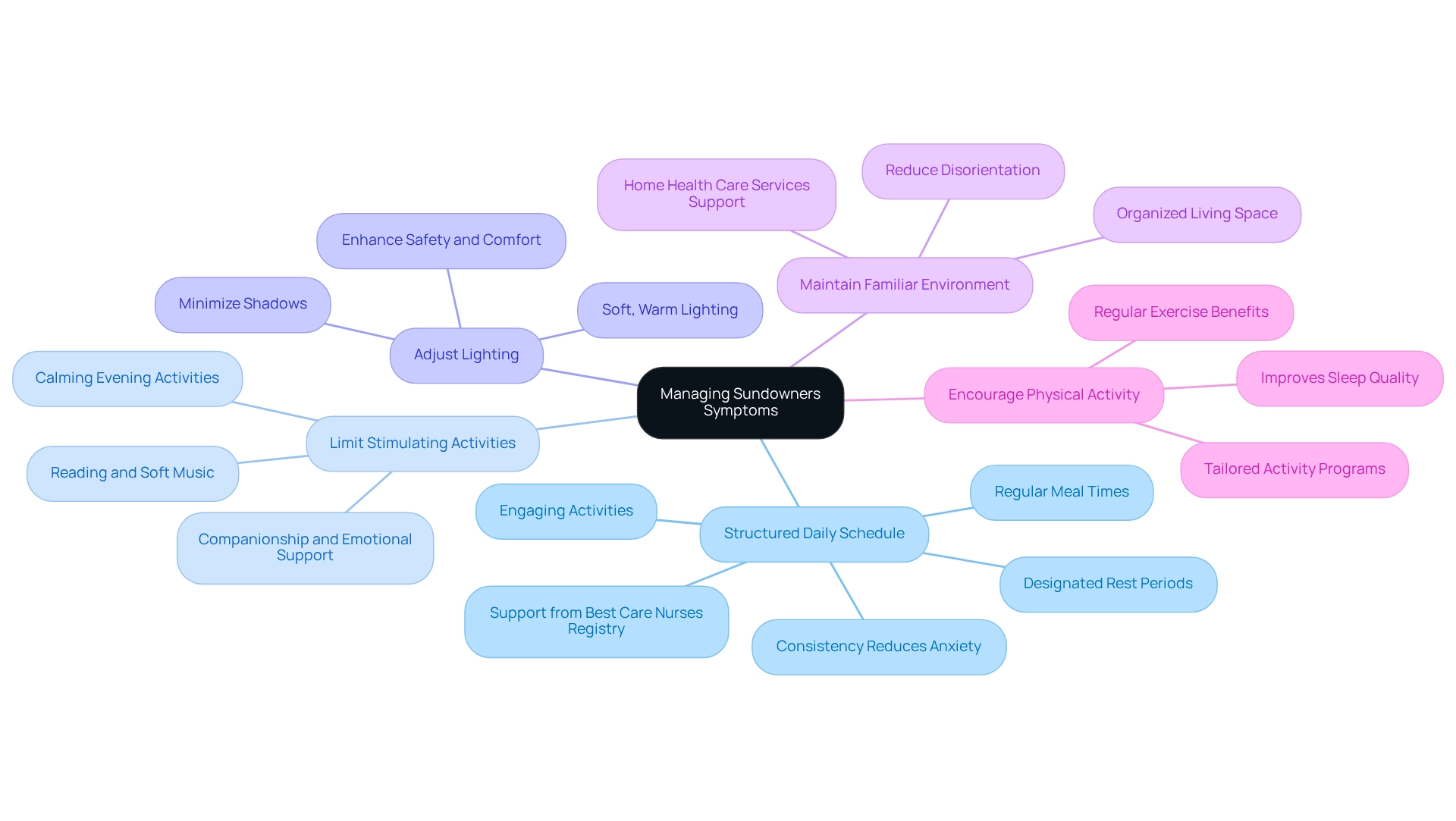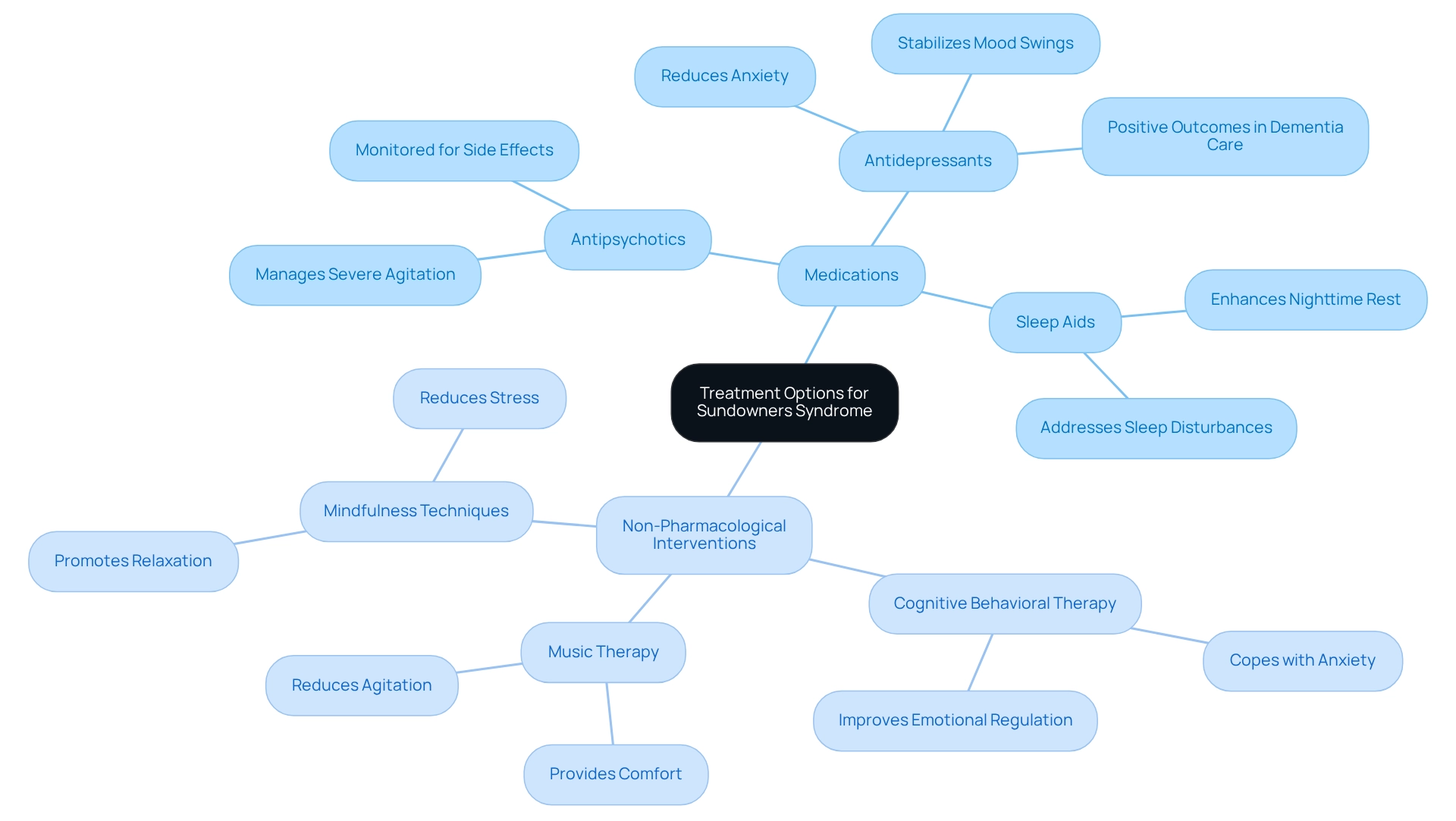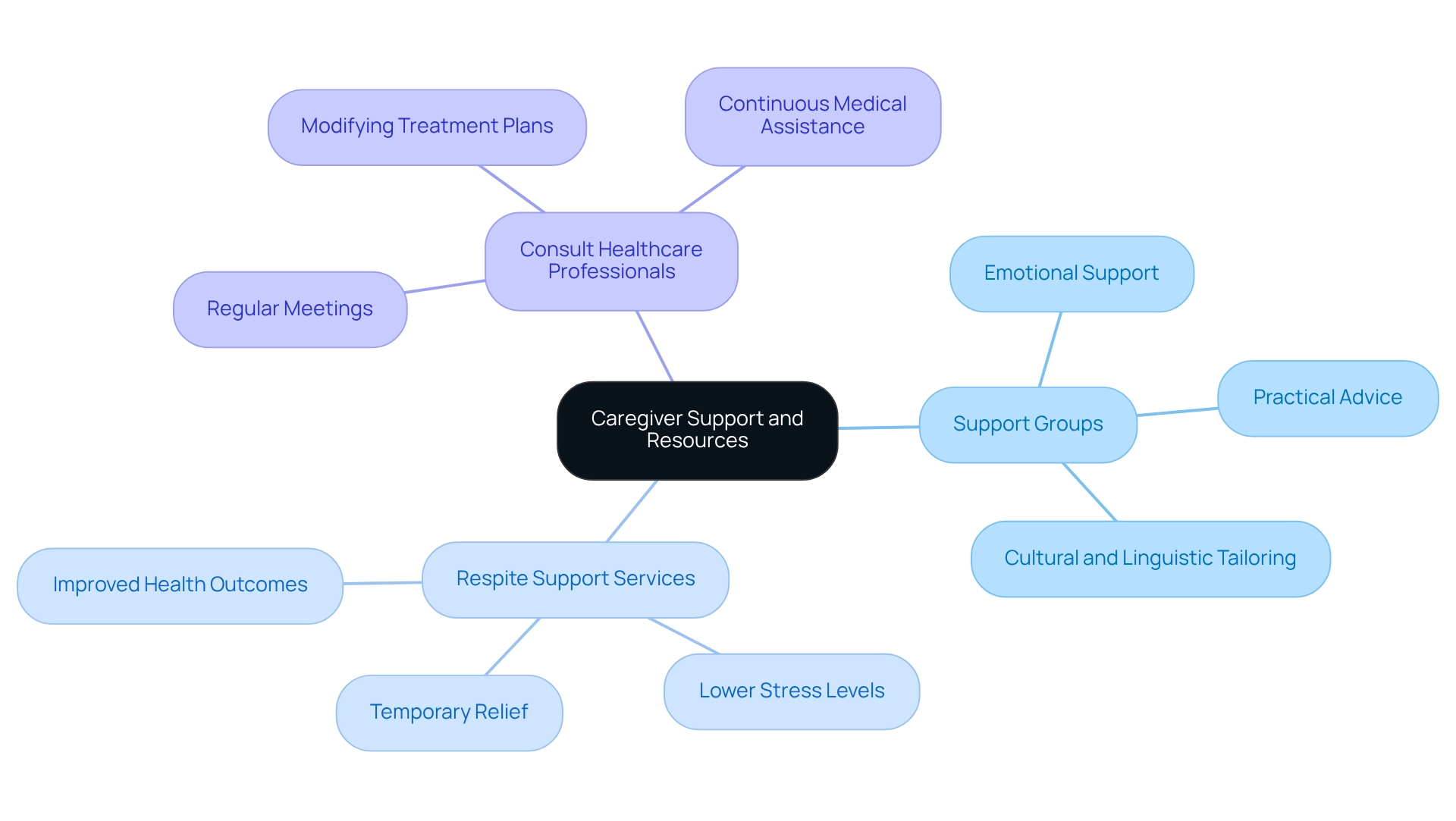Overview
Sundowners Syndrome can be a challenging experience for individuals with dementia, often marked by increased confusion, agitation, and behavioral changes, especially during the late afternoon and evening. It’s important to understand that these changes can stem from various causes, including disruptions in circadian rhythms and fatigue. We recognize how distressing this can be for both individuals and their loved ones.
To help manage these symptoms effectively, we encourage the implementation of structured daily routines and thoughtful environmental adjustments. Non-pharmacological interventions can also play a crucial role in alleviating discomfort. By creating a supportive atmosphere, we can foster a sense of calm and stability.
Remember, you are not alone in this journey. We’re here for you, and your comfort is our priority. Together, we can navigate the complexities of Sundowners Syndrome with compassion and care.
Introduction
The complexities of Sundowners Syndrome present significant challenges for individuals with dementia and their caregivers. As daylight fades, many patients experience increased confusion, agitation, and emotional disturbances, making evening hours particularly distressing. We understand how overwhelming this can be for families, and recognizing these symptoms is essential for developing effective management strategies.
This article delves into the various dimensions of Sundowners Syndrome, including:
- Practical approaches for caregivers
- Medication options
- The importance of structured routines and environmental adjustments
By exploring these aspects together, we can better support our loved ones and improve their quality of life during these difficult times. Remember, you’re not alone in this journey; we’re here for you.
Define Sundowners Syndrome: Symptoms and Causes
Sundowners symptoms, which are often observed in individuals with dementia, can create a challenging experience characterized by increased confusion, agitation, and behavioral changes during the late afternoon and evening. It’s important to recognize the key symptoms, which include:
- Increased confusion: Patients may struggle to recognize familiar surroundings, leading to feelings of disorientation.
- Elevated distress levels: This can manifest as agitation, restlessness, and irritability.
- Hallucinations or delusions: Some individuals may perceive things that are not present, heightening their distress.
- Fluctuating emotional responses: This can result in sudden outbursts or withdrawal.
Understanding sundowners symptoms is crucial for caregivers and families, as it allows them to provide better support tailored to the needs of those affected.
While the precise causes of Sundowners Syndrome remain unclear, several contributing factors have been identified:
- Circadian rhythm disruptions: Changes in the body’s internal clock can significantly impact sleep patterns and behavior.
- Fatigue: As the day progresses, tiredness can intensify confusion and agitation.
- Environmental factors: Low light conditions or increased shadows may heighten anxiety in patients.
- Underlying medical conditions: Other health issues can exacerbate the severity of symptoms.
Recent studies highlight the effectiveness of behavioral interventions, such as structured daily activities and physical exercise, in reducing the frequency and intensity of sundowners symptoms. A case study titled “Behavioral Interventions for Sundowning” advocates for these strategies as a primary approach to managing the condition, emphasizing their effectiveness compared to pharmacological treatments.
Furthermore, certain medications, including hypnotics, benzodiazepines, and low-potency antipsychotics, have been linked to increased risks of developing sundowners symptoms. This underscores the need for careful management of treatment options in older adults with dementia. Notably, antidepressants like doxepin have been shown to improve sleep quality without significantly affecting the risk of falls, providing a safer alternative for some patients.
As M. Reimus mentions, “In practice, there is seldom a solitary explanation for the observed symptoms,” emphasizing the intricacy of this condition. By comprehending these symptoms and their origins, we can foster a supportive environment, ensuring that your comfort and well-being remain a priority. Remember, we’re here for you, ready to assist in navigating these challenges together.

Implement Daily Routines and Environmental Adjustments
Managing sundowners symptoms can be challenging, but with the right strategies, caregivers can create an environment that fosters comfort and stability. By establishing consistent daily routines and making essential environmental adjustments, you can significantly alleviate the sundowners symptoms related to this condition. Personalized respite care services from Best Care Nurses Registry can provide invaluable support in this journey.
-
Create a structured daily schedule: Consistency is vital in reducing anxiety. Incorporate regular meal times, engaging activities, and designated rest periods to provide a sense of stability. Best Care Nurses Registry is here to assist in creating and maintaining this schedule, ensuring that seniors receive the support they need while allowing family members to manage their own responsibilities.
-
Limit stimulating activities in the evening: As the day winds down, focus on calming activities like reading or listening to soft music to promote relaxation. Our home health specialists are available to facilitate these activities, offering companionship and emotional support.
-
Adjust lighting: Soft, warm lighting in the evening can create a soothing atmosphere and minimize shadows that may lead to confusion. Caregivers from Best Care Nurses Registry can help implement these adjustments to enhance safety and comfort in your home.
-
Maintain a familiar environment: Keeping the living space organized and familiar can help individuals feel secure and reduce disorientation. Our home health care services ensure that the environment remains conducive to the well-being of seniors.
-
Encourage physical activity: Regular exercise during the day not only enhances overall well-being but also improves sleep quality and reduces evening agitation. Best Care Nurses Registry can design tailored physical activity programs that cater to the individual needs of seniors.
Research indicates that environmental modifications can greatly influence the management of evening confusion. For example, the average age of female residents affected by this condition is 85.5 years, while for males, it is 84.7 years. This highlights the importance of tailored approaches for older adults. Caregivers have reported that effective modifications, such as maintaining a calm and familiar setting, can alleviate sundowners symptoms and improve the quality of life for those experiencing this condition. As noted by Scarmeas, “There is no clear evidence that prophylactic use of melatonin, AChEIs, or NMDA receptor antagonist is effective in prevention of sundown syndrome development in dementia,” reinforcing the significance of focusing on environmental adjustments and routines rather than relying solely on medication. Furthermore, the case study titled “Need for Research on Sundowning” emphasizes the necessity for caregivers to adopt practical strategies in the absence of extensive research. By concentrating on these strategies, caregivers can cultivate a nurturing atmosphere that promotes comfort and lessens the challenges associated with evening confusion.
For personalized support and to learn more about how Best Care Nurses Registry can assist you, please call (888) 203-2529 today. Your comfort is our priority, and we’re here for you.

Explore Medication and Treatment Options for Sundowners Syndrome
While there is no definitive cure for Sundowners Syndrome, various treatment options can effectively manage sundowners symptoms, bringing comfort and relief to those affected. Medications are an essential part of this journey. It is crucial to consult with a healthcare provider regarding potential medications that may alleviate symptoms, including:
- Antidepressants: These can help stabilize mood swings and reduce anxiety, contributing to overall emotional well-being. Recent statistics indicate that the use of antidepressants in dementia care has shown positive outcomes in managing mood-related symptoms.
- Antipsychotics: For those experiencing severe agitation or hallucinations, these may be prescribed to help manage distressing symptoms. Expert insights emphasize that careful monitoring is essential when using these medications due to potential side effects.
- Sleep aids: Short-term use of sleep medications can enhance nighttime rest, addressing sleep disturbances common in affected individuals. Sleep studies are often recommended to diagnose conditions like restless leg syndrome, which can exacerbate sleep issues in dementia patients.
In addition to medications, non-pharmacological interventions can play a significant role in symptom management:
- Cognitive Behavioral Therapy (CBT): This therapeutic approach assists patients in coping with anxiety and confusion, fostering better emotional regulation. Research indicates that CBT can lead to significant improvements in emotional well-being for individuals with dementia.
- Music Therapy: Engaging with music provides comfort and reduces agitation, creating a calming environment. Case studies have demonstrated the effectiveness of music therapy in enhancing the quality of life for dementia patients.
- Mindfulness and Relaxation Techniques: Practices such as deep breathing exercises and guided imagery can effectively calm the mind, promoting relaxation and reducing stress.
Incorporating these treatment options can significantly improve the quality of life for individuals experiencing sundowners symptoms, allowing for a more manageable daily routine. At Best Care Nurses Registry, we’re here to provide personalized care solutions, ensuring that your loved one is safe and happy at home while you find emotional relief. As expert Hess points out, the decline of sleep structure in dementia patients can result in heightened symptoms of evening agitation, emphasizing the significance of thorough evaluations and customized treatment strategies. Your comfort is our priority, and we are here to support you every step of the way.

Engage Caregiver Support and Resources for Effective Management
Caregivers, we understand the challenges you face, and it’s vital to actively seek support and utilize available resources to effectively manage sundowners symptoms.
-
Join support groups: Engaging with fellow caregivers can offer invaluable emotional support and practical advice. Research suggests that involvement in support groups greatly reduces stress for family members providing care, promoting a sense of community and shared experience. Many individuals, including certain racial or ethnic groups, LGBT supporters, and those with limited health understanding, encounter the extra challenge of locating culturally and linguistically customized services suitable for their loved ones’ needs.
-
Utilize respite support services: Taking breaks is essential for your well-being. Respite support offers temporary relief, enabling you to recharge. Studies show that individuals who utilize respite services report lower levels of stress and improved health outcomes. As of 2025, support resources specifically designed for managing sundowners symptoms have become increasingly accessible, reflecting a growing awareness of the challenges encountered by caregivers. Numerous organizations provide educational resources focused on dementia support and sundowners symptoms, enhancing understanding and management strategies. These resources empower caregivers with knowledge and techniques to navigate challenging situations more effectively. By improving dementia support navigation, we can foster a more sustainable and compassionate healthcare system that supports you in your role.
-
Consult healthcare professionals: Regular meetings with physicians or geriatric specialists are crucial for modifying treatment plans as necessary. Expert views emphasize the significance of continuous medical assistance to ensure optimal treatment for both the patient and the supporter.
Case studies reveal that higher levels of caregiving stress correlate with health risk behaviors, underscoring the necessity for targeted interventions. By leveraging these resources, caregivers can enhance their resilience and provide better care for their loved ones. Remember, you are not alone in this journey; we’re here for you.

Conclusion
Recognizing and addressing Sundowners Syndrome is essential for improving the quality of life for individuals with dementia and their caregivers. The symptoms, including increased confusion, agitation, and emotional disturbances, can pose significant challenges, particularly during the evening hours. By understanding these symptoms and their underlying causes, caregivers can implement effective management strategies such as:
- Establishing structured daily routines
- Making environmental adjustments to create a calming atmosphere
In addition to practical approaches, we must not overlook the role of medication and treatment options. While pharmacological interventions may provide relief, non-pharmacological strategies like:
- Cognitive behavioral therapy
- Music therapy
can also play a crucial role in managing symptoms. Caregivers are encouraged to seek support from healthcare professionals and utilize available resources, including:
- Respite care
- Educational materials
to enhance their ability to cope with the demands of caregiving.
Ultimately, the journey of managing Sundowners Syndrome can be daunting, but it is vital to remember that support is available. By prioritizing structured routines, environmental modifications, and appropriate treatment options, caregivers can create a nurturing environment that fosters comfort and reduces distress for their loved ones. Embracing these strategies not only benefits individuals experiencing sundowning but also supports caregivers in maintaining their own well-being during this challenging period. Remember, you are not alone in this journey; we’re here for you.
Frequently Asked Questions
What are the main symptoms of Sundowners Syndrome?
The main symptoms include increased confusion, elevated distress levels (agitation, restlessness, irritability), hallucinations or delusions, and fluctuating emotional responses (sudden outbursts or withdrawal).
Why is it important to understand Sundowners symptoms?
Understanding these symptoms is crucial for caregivers and families as it allows them to provide better support tailored to the needs of those affected.
What factors contribute to Sundowners Syndrome?
Contributing factors include circadian rhythm disruptions, fatigue, environmental factors (such as low light conditions), and underlying medical conditions.
What interventions are effective in managing Sundowners symptoms?
Behavioral interventions, such as structured daily activities and physical exercise, have been shown to reduce the frequency and intensity of Sundowners symptoms.
Are there medications that can influence Sundowners symptoms?
Yes, certain medications like hypnotics, benzodiazepines, and low-potency antipsychotics may increase the risk of developing Sundowners symptoms. However, antidepressants like doxepin can improve sleep quality without significantly increasing the risk of falls.
What does the quote from M. Reimus suggest about Sundowners Syndrome?
The quote emphasizes that there is rarely a single explanation for the symptoms observed in Sundowners Syndrome, highlighting the complexity of the condition.











